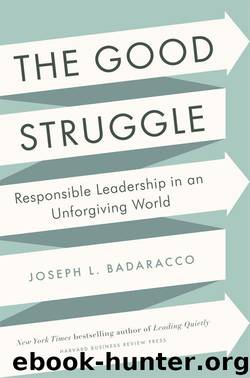The Good Struggle: Responsible Leadership in an Unforgiving World by Joseph L. Badaracco Jr

Author:Joseph L. Badaracco Jr. [Badaracco Jr., Joseph L.]
Language: eng
Format: mobi
ISBN: 9781422191644
Publisher: Harvard Business Review Press
Published: 2013-09-16T14:00:00+00:00
Next Right Steps
Leaders rely on evolving commitments for three practical reasons. First, they can. Knowledge-based organizations are more flexible than traditional manufacturing firms with dedicated factories, and firms that sell products today can rely on outsourcing and flexible factories to “produce” them. Second, they often have to. A wide range of actors are typically involved in monitoring and shaping an organization’s decisions; these parties want a say in what the organization does, and their own agendas are continuously evolving in response to the continuously shifting, sometimes turbulent markets around them.
The third and most important reason for leaders to rely on evolving commitments is that they should. Responsible decisions should not outrun visibility, and, in a recombinant world, it is hard to see much of the future. In addition, there is a great deal to be learned from execution, experiment, and actual experience. Finally, going step by step provides people inside an organization and all the parties in the multiple markets around it with clear, immediate objectives and even metrics.
This enables all these parties to concentrate their efforts, focus on meeting specific objectives, and not be paralyzed by endless possibilities. The greater the uncertainty, the more important it is for leaders to provide a clear path, even if it is almost certain to be adjusted and readjusted, to enable others to commit, plan, and work with a strong sense of confidence.
What counts as a “right next step”? It is a task, a project, or an assignment that is clearly defined, doable, and has a significant probability of contributing to a larger, longer-term aim—as that aim is currently defined. The right next step, in many cases, also takes two lessons from modern finance. First, it opens up options for subsequent steps. Second, it gets the risks right. In other words, high-risk, low-reward activities—however bold and exciting they may sound—are rarely the right next step.
In addition, in a knowledge-based world, the right next step often serves as an experiment. That is, it creates knowledge that can be used to plan subsequent steps or even test and adjust the larger aim. The great industrial companies of the last century developed long-term strategies and sought to execute them as efficiently as possible. Now, in a knowledge-based economy, “execution as learning” is becoming much more important.11
A clear example of this approach is the staged investments that venture capital firms make in new businesses. Each round of investment depends on whether an entrepreneur and an organization have met a set of shorter-term objectives and metrics. If they haven’t, they need persuasive explanations of what happened, what they would do differently the next time, and why another approach is likely to work better. The critical challenge in many successful entrepreneurial ventures is repeatedly hitting a series of short-term targets under the pressure of limited cash, close scrutiny from market players, and a serious prospect that failure will reduce financing or lead to new leadership or both.
The “next right step” approach reflects the observation of Professor Lynda Applegate, who has studied and worked with entrepreneurs for three decades.
Download
This site does not store any files on its server. We only index and link to content provided by other sites. Please contact the content providers to delete copyright contents if any and email us, we'll remove relevant links or contents immediately.
Rich Dad Poor Dad by Robert T. Kiyosaki(6613)
Bad Blood by John Carreyrou(6611)
Principles: Life and Work by Ray Dalio(6422)
Playing to Win_ How Strategy Really Works by A.G. Lafley & Roger L. Martin(6251)
Management Strategies for the Cloud Revolution: How Cloud Computing Is Transforming Business and Why You Can't Afford to Be Left Behind by Charles Babcock(4568)
The Confidence Code by Katty Kay(4251)
Thinking in Bets by Annie Duke(4218)
American Kingpin by Nick Bilton(3876)
Delivering Happiness by Tony Hsieh(3418)
Project Animal Farm: An Accidental Journey into the Secret World of Farming and the Truth About Our Food by Sonia Faruqi(3215)
The Power of Habit by Charles Duhigg(3130)
The Tyranny of Metrics by Jerry Z. Muller(3067)
The Marketing Plan Handbook: Develop Big-Picture Marketing Plans for Pennies on the Dollar by Robert W. Bly(3057)
Brotopia by Emily Chang(3050)
Mastering Bitcoin: Programming the Open Blockchain by Andreas M. Antonopoulos(3036)
I Live in the Future & Here's How It Works by Nick Bilton(2994)
The Content Trap by Bharat Anand(2917)
Building a StoryBrand by Donald Miller(2896)
Applied Empathy by Michael Ventura(2893)
